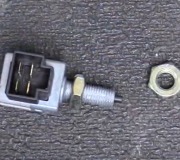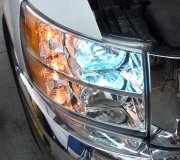Abuse the vehicle has been through: the guy I got it from installed the battery the wrong way. In addition to this both fuse 10 (20A) and 11 (15A) were replaced with higher rated fuses to keep them from blowing, I think possibly up to 30A fuses. This allowed him to drive it without the brake lights going out from a blown 11 fuse.
What I’ve tried. The vehicle now has a new alternator, primary battery, brake switch, brake pressure switch (& plug), and fuses. I’ve checked continuity for the full length of the brake circuit and it looks good. I have tested both the multi-function switch and the headlamp switch. I’ve plugged in a code reader to find no DLC’s. I’ve checked for the appropriate voltage at the brake switch plug. I’ve checked every fuse and fusible link, as well as partially tested the PCM relay. Finally I’ve checked right & left back bulbs.
The vehicle is equipped with what looks to be aftermarket trailer brakes and an auxiliary battery. Probably an unrelated problem but I found out that both the 20 (electric brake controller) and 22 (trailer battery charge) fuses in the engine bay were blown, so I replaced those as well. I do not know what’s wrong. PCM? Thanks for any ideas or help!
SPONSORED LINKS
Monday, June 11th, 2012 AT 3:59 AM




